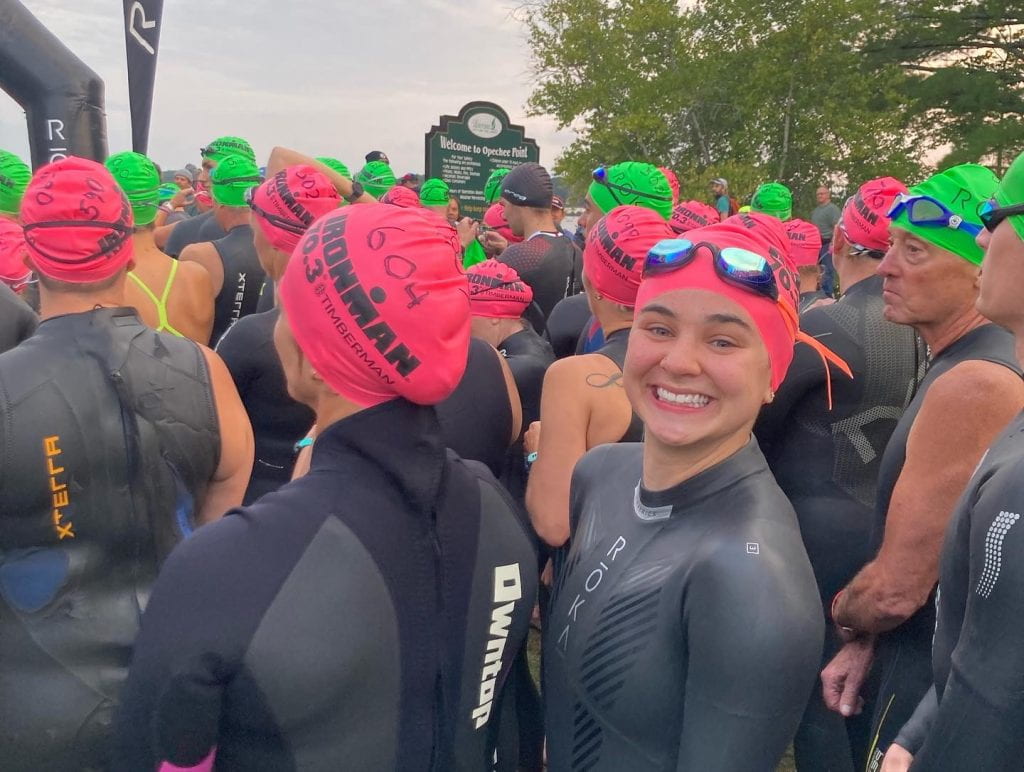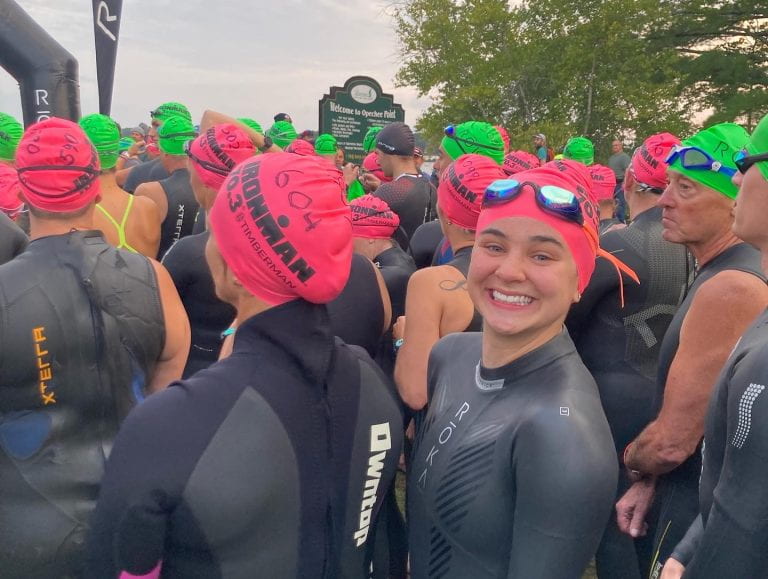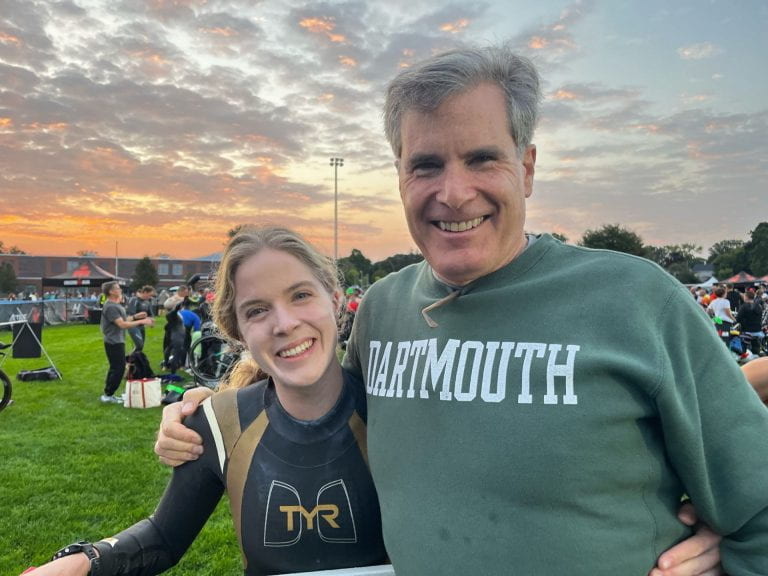Published: Oct. 10, 2022
On Sept. 18, I attempted my first half-Ironman triathlon (that’s 1.2 miles of swimming, 56 miles of biking, and a half-marathon run) at the beautiful Timberman course in Laconia, New Hampshire—and what a journey it was to get there.
To begin with a bit of context, I joined the Dartmouth Triathlon Team on a whim last winter, when a friend of mine added me to the team’s GroupMe. That friend never ended up attending a single team practice, but somehow I found myself braving the bitter Hanover cold on my way to my first ever swim practice. I couldn’t find the women’s locker room and arrived half an hour late without a swim cap or goggles or any clue about what I was doing. After just one arduous lap of swimming a pitiful attempt at freestyle (as in one length of the pool, not even a there-and-back), I was winded and needed to catch my breath. It’s an understatement to say that I felt incredibly out of place.
But fortunately, Coach Jim helped me learn how to improve my stroke, how to take breaths, how to keep my body from twisting over itself, how to keep my arms stretched way out in front, and how to love to swim. I completed a 50-yard lap without taking a break. And then I did my first 100-yard. And my first 200-yard. And during our indoor triathlon at the end of 21W, I swam 400 yards for the first time ever and was by far the slowest swimmer on the team. But it didn’t matter, because I did it.
It was admittedly crazy to sign up for a half-Ironman race when each leg on its own felt like a grueling challenge. But I was fortunate to work with Jim to put together a training plan that worked its way up from manageable distances, flexible enough to accommodate my full-time work schedule and an unplanned two-week-long training hiatus when I broke my toe.
I trained this summer while living and working at the Moosilauke Ravine Lodge, which had its ups and downs, literally and figuratively. Being located on one of New Hampshire’s 4000 footers meant it was impossible to find flat running routes, so my confidence in my ability to handle hills while running soared. Constrained by rural mountain roads, the shortest bike loop I could complete — a ride “around the block,” so to speak — was almost 50 miles long with over 4000 feet of elevation gain, so I was forced to become comfortable with long rides.
But swimming was the leg of the race I was most worried about, as it was also the most difficult to train for. I tried to drive to the Hanover pool about once a week, but the two hours of driving weren’t always feasible, and I didn’t feel super comfortable going on solo open water swims. This meant that I ended up cramming my swim training into the three weeks before the race when I would be back on campus with access to the Alumni pool, and as a non-swimmer, it wasn’t always easy to trust the process. I found myself comparing my pace to the swim cutoff time, wondering whether I would get pulled from the water.
Race weekend arrived sooner than I expected after a whirlwind first week of classes. I drove to Laconia on Saturday morning, meeting up with teammates and some of our incredible supporters for a short warm-up and the athlete check-in meeting. It was reassuring to see athletes of all ages and identities, whom I overheard speaking about traveling from all over—they came from so many walks of life, and if they could do the race, then so could I. It was with this resolute attitude that I tuckered in for a decent night’s sleep, ready to face the race ahead of me the next day.
Race Day
One 4:45 a.m. wakeup and Dunkin pre-race pit stop later, I found myself rushing to set up my transition station, top off my bike tires with air, squeeze my way into my wetsuit, and battle the long port-a-potty lines before the race began. It was a rush of a morning, but by 7 a.m., I was running into the beautiful waters of Opechee Bay while a beautiful sunrise illuminated the surrounding mountains.
* * *
After all of the stress, the long drives to the Hanover pool, the cold mornings of swimming through choppy water, the swim ended up being my favorite leg of the race. I felt confident in my stroke and mentally comfortable being in the water. When the water got crowded at turn buoys, I would switch to breaststroke to help with my sighting. I told myself that I would finish when I finished, and I was at peace with being in the water for as long as it would take. To my surprise, I finished far before the cutoff time, in a sense having already accomplished a feat that would have been incomprehensible to me just a few months prior.

* * *
And I was on the bike! The ride felt easy compared to my mountain climbs this summer, and I was able to hydrate and fuel myself well. I did down an entire bottle of water during the first 10 miles, which forced me to stop at an aid station to refill, but I think this helped me with recovery from the swim. I made it through just fine without purchasing any fancy gels or snacks for the race; I just brought along the snacks I had access to in my dorm room since that was all I had been consuming for the training process. Forcing myself to continuously be eating was tough, but I knew I would need the fuel later on. I barely noticed the elevation gain and was able to enjoy the riding experience—except for the truck I almost crashed into which had decided to pull a three-point turn on the state highway.
Coasting back into transition, I felt exhausted but excited to have made it to the run. Whenever I visualized my worst-case race day scenarios, I had imagined myself getting tripped up by the swimming or the biking legs, as I had no experience whatsoever with swim or bike racing before joining the team. I thought the run would feel like a treat after the first two legs of the race, yet jogging out that day I was sluggish and slow. I found myself counting down the distance until I would reach the next aid station, where I permitted myself to walk, drink water and Gatorade, and toss some ice cubes in my hat to keep me cool. At one aid station about halfway through I needed to stop for a bathroom break, and so I took time to eat a banana for more fuel. I was fading, but I had to keep going.
My savior during the run ended up being Beth, a 60-something-year-old rock star who was completing her second half ironman and fifth overall triathlon of the race season. She asked me about my Dartmouth kit while we were running next to each other, and I remembered that she had passed me during the bike ride. She would tell me that I should be running faster than her, since I was younger, and I would take off ahead and eventually slow down and she’d catch up to me again and the whole scene would repeat. In those moments when I was moving slowly, she would encourage me along and rejuvenate my energy. The last time we met each other was around mile 11 of the race—from then on, I was speeding towards the finish, ready to complete this impossible goal of mine.
I raced the final mile through the streets of Laconia with a goofy smile plastered across my face. I felt so proud of myself for sticking with a race that for weeks I didn’t know if I could finish—and that some of my friends and family had thought I was crazy for attempting. Not only had I completed the race, but I had raced smart, without pushing myself beyond a sustainable pace, finishing strong with gas left in the tank.
In the future, I could see myself attempting another race of this distance and pushing myself to race my best possible time. But I’ve realized that I don’t think it would be feasible to train for another race like this while taking classes, since having an off term this summer provided me with the flexibility I needed to commit to the training program.
I also realized that the achievement of high-clout races like this one really boils down to resources, more than endurance or drive. You have to be able to invest so much money and so much time in order to complete a half-Ironman race, and I am incredibly privileged to be in a position to do so, supported by the Dartmouth Triathlon Team. I also know that so many more people would be able to participate in a race like the Timberman, if only the sport was more accessible, which leaves me feeling bittersweet about the accomplishment.

I need to give another shout out to the incredible people who made the race as fantastic of an experience as possible. Thank you to Ben and Evelyn and Annaliese, the Dartmouth Tri-Team tri-hards who filled in for the coaches as our biggest race day supporters. Thank you to Beth and all of the other badass athletes who inspired me during the race, especially the phenomenal women who cheered each other on whenever we passed each other on the course. Thank you to the residents of Laconia, who set out water bottles and turned on their sprinklers and blasted music from their porches and motivated us along the course. The unforgettable kindness of the supporters and volunteers will stick with me.
Finally, I accomplished this race while being far from the most committed member of the Dartmouth Triathlon Team. Joining the team last winter (instead of in the fall like most ‘25s), I struggled to fit in with the team socially; consequently, I had trouble engaging in many of the team activities. I only attended practices last year that felt comfortable and accessible to me, like runs and spins, and maybe the occasional strength session. Embarrassingly enough, I’ve never been on a team bike ride. I’ve never gotten close to completing an entire workout at swim practice. Don’t ask me what UVRC stands for, because in all honesty, I’m not quite sure what that is. So to the ‘26s and other tri team newcomers, if you see me at practice, I may be wearing my 70.3 T-shirt, but there’s a strong chance I’m figuring things out for myself just as much as any of you.

About the Author: Sophie Lewis is a ‘25 from Newton, Massachusetts. She studies Earth Sciences and History and is interested in environmental law.






